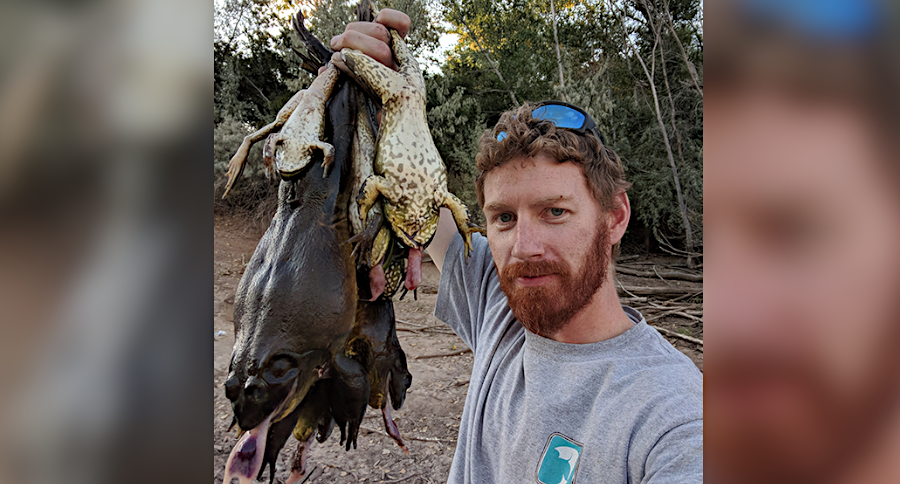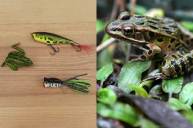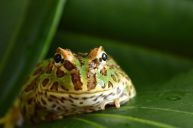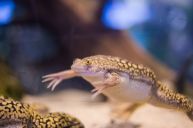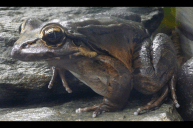Utah officials are encouraging people to take as many bullfrogs as possible.
It is rare for wildlife officials to take on what amounts to an "anything goes" policy for any sort of hunting. The rare exceptions are with invasive animals like feral hogs or in the case of Utah, with bullfrogs.
Yes, bullfrogs are considered an invasive species in the Beehive State and local officials want you to go out and bag some. In fact, they would be thrilled if you took as many as you can possibly catch.
In a recent blog post, the DWR encouraged residents to get outside and bag some of the invasive animals for the dinner table this summer.
Why bullfrogs?
You can find enormous #bullfrogs here in Utah. They're an invasive species (so catch as many as you want), and they're really tasty!
See this blog post for tips on catching and cooking them: https://t.co/1xtdnno5ZO pic.twitter.com/cXrxDLJgvo
— UtahDWR (@UtahDWR) June 24, 2020
In a DWR blog post, Lee Kay Public Shooting Range Facilities and Grounds Supervisor Ja Eggett explains that a population of the amphibians has lived in Utah since sometime in the 1970s. Unfortunately, the creatures are incredibly harmful to native fish, toad and mice populations thanks to the frog's incredible appetite for just about anything they can catch. They have even been documented eating quail in the past.
"The largest of all North American frogs, bullfrogs can grow to a length of 8 inches or more and can weigh up to 1.5 pounds," the post reads. "So target the big ones - they have the most meat."
Eggett recommends the Great Salt Lake areas and Wasatch Front as two hotspots for catching these large amphibians. These animals vary in coloration from gray to green or even brown. They often have dark spots. Look for the large ear drum and exceptional size as a clue that you have found the right species. Odds are, you will hear the bullfrogs calling before you see them.
How to catch them and cook them
Fortunately, that voracious appetite does the frogs no favors when it comes to catching them. The DWR is recommending using fishing gear. Eggett recommends a simple bobber and hook to play into the animal's predatory instincts. Some people use tiny lures or bait their hooks like they would for fish, but Eggett puts his hooks directly on the fishing bobber after finding Kermit was striking that more than his bait.
"I rethought my strategy and soon ditched the marshmallow and started putting a hook directly on the top and bottom of the bobber," Eggett said. "The next cast was a success. When the frog gulped the bobber, he also got hooked."
He also notes that it is possible to take bullfrogs with bowfishing gear. Some people also hunt them simply by grabbing them. A third option is to buy a "frog gig," which is simply a multi-pointed spear designed specifically for hunting frogs. In either case, there is no catch-and-release here. The DWR wants these things dead before you transfer them and any leftover parts must be disposed away from where you caught the animal to prevent the spread of an amphibian infection called Chytrid.
One of the great things about frogs is that they require little preparation to make a delicious meal. Cleaning frogs can be a bit tricky, so you may want to watch a video or two on how to do it first. The easiest way to prepare frog legs is to simply bread them with flour and fry them in a pan with your favorite seasonings or butter. Frog legs are a lot like morel mushrooms in that they are simple to gather and even easier to prepare. If you were looking for a totally new dish to try out this summer, give bullfrog a chance. Who knows? You may just find a new favorite summertime tradition!
For more outdoor content from Travis Smola, be sure to follow him on Twitter and check out his Geocaching and Outdoors with Travis YouTube channels.
NEXT: THE AXIS DEER AND HOW THEY'RE IMPACTING PARTS OF THE UNITED STATES
WATCH
